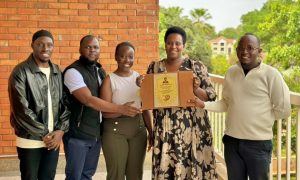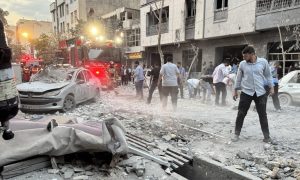In the remote region of Karamoja, northern Uganda, Losakucha Primary School in Kapeta Sub-county, Kotido District, has become a striking example of how far communities are willing to stretch the limits of survival in pursuit of education.
The school, which currently accommodates 1,557 pupils, has resorted to turning its classrooms into makeshift dormitories to accommodate over 150 boarding students, despite the absence of any proper boarding facilities.
The headteacher, Ms Susan Akot, confirmed that 155 pupils, 88 boys and 67 girls, currently sleep at the school as boarders, including 43 Primary Seven candidates who are preparing for their final national examinations.
With no purpose-built dormitories, the school has converted learning spaces into sleeping areas. Each evening, pupils clear desks from the classrooms and spread worn-out mats, blankets, or even old coats on the hard concrete floors to rest. At dawn, the same classrooms are swept and turned back into learning environments.
The decision to admit boarders, according to the school administration, was a desperate yet necessary measure to curb high absenteeism and dropout rates among pupils, many of whom travel over nine kilometers each day to attend class.

During rainy seasons or periods of food scarcity, attendance drops sharply. Allowing students to remain at school overnight is viewed as the only realistic intervention to keep them learning.
However, the solution has come with enormous costs. The lack of basic dormitory infrastructure means students sleep without proper bedding, ventilation, or lighting.
There is no kitchen on-site, and meals are prepared using firewood outdoors, depending entirely on food contributed by struggling parents. The girls are particularly vulnerable, as most are forced to walk home each evening due to lack of space, exposing them to insecurity and undermining their ability to concentrate on studies.
The situation has also placed an extraordinary burden on the teaching staff, who now perform multiple roles beyond instruction. Teachers rotate night shifts to supervise and protect pupils, often sleeping on benches inside classrooms.
In the absence of security personnel, school leaders like Deputy Headteacher Mr James Lomuria remain on-site through the night to ensure the safety and welfare of the learners. The staff, stretched beyond capacity, continues to serve as educators, guardians, cooks, medics, and counsellors.

Despite the overwhelming limitations, the school community has taken bold steps toward self-reliance. The residents of Kapeta Sub-county have donated 20 acres of land to the school to be used for cultivating food crops. Parents have pledged to prepare and plant the land when rains arrive, aiming to reduce the school’s dependence on outside support for feeding pupils.
Additionally, Losakucha Primary School has recently benefited from a water and sanitation project implemented by UNICEF under the KOICA partnership.
The project, which targeted over 65,000 learners in Karamoja, provided the school with a functional borehole and improved hygiene facilities. Nevertheless, these improvements fall short of meeting the broader needs of a growing boarding population without basic sleeping arrangements, lighting, or storage facilities.

The use of classrooms as dormitories remains a contentious issue nationally. The Ministry of Education and Sports has repeatedly warned against the practice, citing safety concerns such as potential fire outbreaks, disease transmission, and overcrowding.
In some districts, like Amolatar, authorities have actively banned it. However, education officials in Kotido have defended the school’s actions, saying that policy must be responsive to context and that in many cases, the only alternative to this arrangement would be to let the children drop out altogether.
Local education stakeholders, community leaders, and school authorities have now appealed to the central government and development partners to intervene urgently. They are calling for the construction of basic dormitories, a school kitchen, solar lighting, beds, and bedding to ease the burden on pupils and teachers alike.
Despite the hardship, the spirit at Losakucha remains unbroken. Teachers report improved attendance, a sense of purpose among pupils, and increased engagement in class especially among the Primary Seven candidates. Many students, despite sleeping in classrooms, remain hopeful that their sacrifice will lead to a better future.
In the words of one pupil, 12-year-old Lokol Joseph, “I sleep beside my books and that reminds me why I must stay.” For the children of Losakucha, education is more than a routine it is a lifeline. Their determination, forged in some of the harshest conditions, is a testimony to Uganda’s untapped potential. What remains is for the nation to match their courage with investment.






















